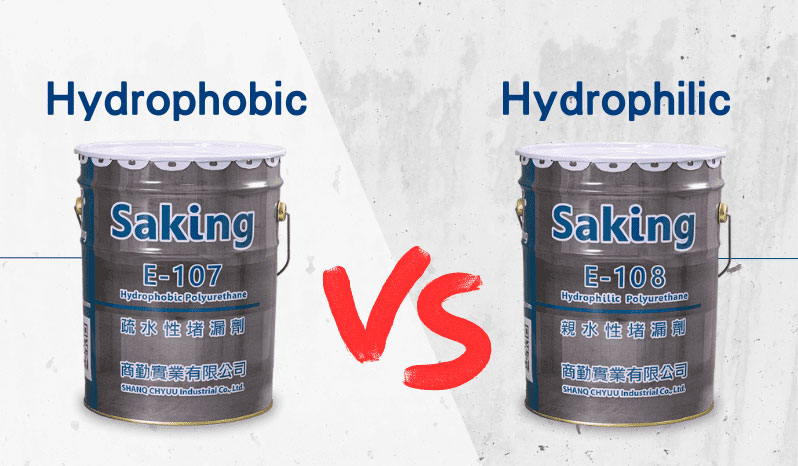Understanding Hydrophobic and Hydrophilic Polyurethane-Applications and Benefits

In the world of polyurethane (PU) chemistry, the terms "hydrophobic" and "hydrophilic" are commonly encountered. These two types of polyurethanes play crucial roles in various industrial applications, offering distinct properties that cater to different needs. This article aims to delve into the differences between hydrophobic and hydrophilic polyurethane, their respective applications, and the benefits they bring to different industries.
What is Hydrophobic Polyurethane?
Hydrophobic foaming agents are designed to repel moisture, making them ideal for applications requiring water resistance. E-107 Hydrophobic Polyurethane rapidly expands upon contact with water, effectively filling cracks or voids. This feature allows it to form a tight seal in leaking areas, effectively stopping the source of the leak. It ensures durability and longevity even in damp or moist environments with excellent adhesion, allowing it to firmly bond to various substrates such as concrete and masonry, enhancing waterproofing performance. Consequently, hydrophobic foaming agents have become the preferred choice for waterproof coatings, sealants, and protective layers in the construction, automotive, and marine industries.
Shangqin offers E-107 Hydrophobic Polyurethane, a high-performance product specifically designed for leak prevention applications. It provides exceptional water resistance, making it ideal for environments requiring long-term waterproof protection. Learn more about E-107 Hydrophobic Polyurethane.
Applications of Hydrophobic Polyurethane
Waterproof Coatings: Hydrophobic polyurethane is widely used in waterproof coatings for buildings, bridges, and other infrastructure to prevent water ingress and protect structural integrity.
Sealants: In the automotive industry, hydrophobic PU sealants are employed to protect vehicle components from water damage, ensuring long-term performance.
What is Hydrophilic Polyurethane?
Hydrophilic polyurethane, on the other hand, is characterized by its ability to absorb water and swell upon contact with moisture. This property is particularly useful in applications that require materials to react with water to form a seal or barrier. Hydrophilic PU is commonly used in water-stopping technologies, medical devices, and specific coatings where controlled water interaction is beneficial.
The E-108 Hydrophilic Polyurethane is an excellent example of a product that effectively uses this property. It is specifically engineered to absorb water and swell to create a tight seal, making it ideal for use in construction joints, cracks, and other areas where water ingress is a concern. Learn more about E-108 Hydrophilic Polyurethane here.
Applications of Hydrophilic Polyurethane
Waterstops: In construction, hydrophilic PU is often used in waterstops, where it swells to seal cracks and joints in concrete, preventing water leakage in tunnels, basements, and dams.
Coatings: Hydrophilic PU coatings are used in specific industrial processes where the material’s interaction with water improves adhesion or other functional properties.
Benefits and Considerations
Both hydrophobic and hydrophilic polyurethanes offer unique benefits depending on the application. Hydrophobic PU provides excellent resistance to moisture and is ideal for environments where water exposure is a concern. Conversely, hydrophilic PU is valuable in applications requiring water interaction, offering controlled swelling and sealing properties.
To maintain and clean polyurethane equipment, it's essential to use a dedicated cleaner like the G-201 Polyurethane Cleaner. This product ensures that all residues are effectively removed, prolonging the lifespan of your machinery and ensuring consistent performance. Learn more about G-201 Polyurethane Cleaner here.
Conclusion
Understanding the distinct characteristics of hydrophobic and hydrophilic polyurethane is crucial for selecting the right material for specific applications. Whether you need to repel water or use it to your advantage, polyurethane chemistry offers versatile solutions to meet the demands of various industries.
With over 30 years of experience, Saking has an unshakable commitment to becoming the leader in leak-proofing products. We specialize in the manufacture of high-pressure grouting machines, spray paint machines, and leak-proofing materials. If you're looking for reliable and innovative solutions for your leak-proofing needs, contact us today to learn how we can help protect your projects with our cutting-edge technology and expertise.
